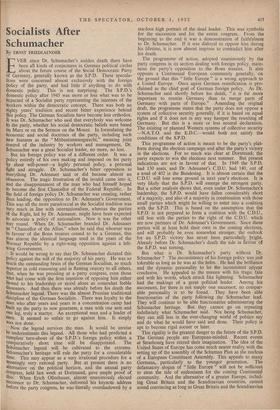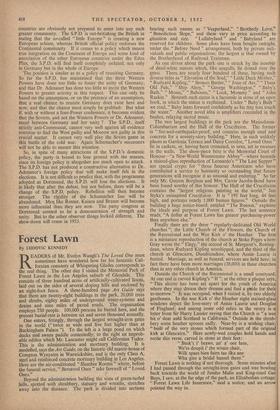Socialists After Schumacher
By ERNST FRIEDLAENDER EVER since Dr. Schumacher's sudden death there have been all kinds of conjectures in German political circles about the future course of the Social Democratic Party of Germany, generally known as the S.P.D. These specula- tions were concerned almost exclusively with the foreign policy of the party, and had little if anything to do with domestic policy. This is not surprising. The S.P.D.'s domestic policy after 1945 was more or less what was to be expected of a Socialist party representing the interests of the Workers within the democratic concept. There was both an eighty years' tradition and recent bitter experience behind this policy. The German Socialists have become less orthodox. It was Dr. Schumacher who said that everybody was welcome to the party, whether his social democratic beliefs were based on Marx or on the Sermon on the Mount. In formulating the economic and social doctrines of the party, including such new features as the " Mitbestimmungsrecht," meaning joint control of the industry by workers and management, Dr. Schumacher was a great Socialist leader, no more, no less.
But, his foreign policy was of a different order. It was a policy entirely of his own making and imposed on his party by sheer will-power—a highly personal policy, a personal fight and struggle. Dr. Schumacher's bitter opposition to everything Dr. Adenauer said or did became almok an obsession. The tragic frustration of the invalid came into it, and the disappointment of the man who had himself hoped to become the first Chancellor of the Federal Republic.. In the field of foreign policy Dr. Schumacher was creating, rather than leading, the opposition to Dr. Adenauer's Government. This was all the more paradoxical as the Socialist tradition was very much in line with internationalism, whereas the parties of the Right, led by Dr. Adenauer, might have been expected to advocate a policy of nationalism. Now it was the other Way round. 'When Dr. Schumacher branded Dr. Adenauer as " Chancellor of the Allies," when he said that whoever was in favour of the Bonn treaties ceased to be a German, this Was almost the identical language used in the years of the Weimar Republic by a right-wing opposition against a left- Wing Government.
It would be wrong to say that Dr. Schumacher dictated this policy against the will of the majority of his party. He was so much the outstanding brain of the German Socialists, so much superior in cold reasoning and in flaming oratory to all others, that, when he was presiding at a party congress, even those Who had come with the firm intention of opposing him,either bowed to his leadership or stood alone as somewhat feeble dissenters. And then there was already before his death the Schumacher legend. There was the almost Prussian traditional discipline of the German Socialists. There was loyalty to the man who after years and years in a concentration camp had built up the party to new greatness, a man with one arm and one leg, truly a martyr. An exceptional man and ,a leader of Men. It seemed so unfair to go against him. It simply Was not done.
Now the legend survives the man. It would be unwise to underestimate this legend. All those who had predicted a complete turn-about of the - S.P.D.'s foreign policy, within a. comparatively short time will be disappointed. The Schumacher legend will be cultivated to the extreme. Schumacher's heritage will rule the party for a considerable time. This may appear as a very irrational procedure for a seemingly very rational party. But at present there is no alternative on the political horizon, and the annual party congress, held last week at Dortmund, gave ample proof of this. When Erich 011enhauer, almost unanimously elected successor to Dr. Schumacher, delivered his keynote address before the party congress, he was literally overshadowed by a ten-foot high portrait of the dead leader. This was symbolic) for the succession and for the entire congress. From the beginning to the end it was a demonstration of faithfulness to Dr. Schumacher. If' it was disloyal to oppose him during his lifetime, it is now almost impious to contradict him after his death.
The programme ` of action, adopted unanimously by the party congress in its section dealing with foreign policy, main- tains the party's opposition to the Bonn treaties. It also opposes a Continental European community generally, on the ground that this " little Europe " is a wrong approach to a United Europe. Once again German reunification is pro- claimed as the chief goal of German foreign policy. As Dr. Schumacher said shortly before his death, " it is far more important to reunite. Germany than to merge parts of Germany with parts of Europe." Amending the original draft, the programme states that the party does not, oppose a system of collective security generally, if it is based on equal rights and if it does not in any way hamper the reuniting of Germany. But this is a more or less neutral declaration. The existing or planned Western systems of collective security —N.A.T.O. and the E.D.C.—would both not satisfy the conditions of the S.P.D.
This programme of action is meant to be the party's plat- form during the election campaign and after the party's victory in the elections. For so much was clear at Dortmund; the party expects to win the elections next summer. But present indications are not in favour of that. In 1949 the S.P.D. had 130 seats, and Dr. Adenauer's C.D.U. had 140, out of a total of 402 in the Bundestag. It is almost certain that the C.D.U. will lose some ground in next year's elections. It is very likely that the S.P.D. will emerge the strongest party. But a sober analysis shows that, even under Dr. Schumacher's 'leadership, the S.P.D. would have fallen considerably short of a majority, and also of a majority in combination with those small parties which might be willing to enter into a coalition with the S.P.D. This is based on the assumption that the S.P.D: is not prepared to form a coalition with the C.D.U., still less with the parties to the right of the C.D.U. which are now partners of Dr. Adenauer's Government. Since these parties will at least hold their own in the coming elections, and will probably be even somewhat stronger, the outlook for an S.P.D. victory has never been particularly bright. Already before Dr. Schumacher's death the tide in favour of the S.P.D. was turning.
But what is Dr. Schumacher's party without Dr. Schumacher ? The inconsistency of his foreign policy was juit tolerable as long as he was at the helm. He had the brilliance and the dynamic personality to let the inconsistent appear conclusive. He appealed to the masses with his tragic fate and with his words, which struck like lightning. Schumacher had the makings of a great political leader. Among his successors, for there is not simply one successor, no compar- able personality is to be found. They have been able functionaries of the party following the Schumacher lead. They will continue to be able functionaries administering the Schumacher heritage. But they cannot go on repeating indefinitely what Schumacher said. Not being Schumacher, they can still less in the ever-changing world of politics say and do what he would have said and done. Their policy is apt to become rigid sooner or later. This rigidity is the greatest danger to the future of the S.P.D. The German people are European-minded. Recent events at Strasbourg have stirred their imagination. The idea of the United States of Europe has come much nearer reality with the setting up of the assembly of the Schuman Plan as the nucleus of a European Constituent Assembly. This appeals to many Germans, particularly to the younger generation, The defamatory slogan of " little Europe ' will not be sufficient to stem the tide of enthusiasm for the coming Continental community. And the alternative of a greater Europe, includ- ing Great Britain and the Scandinavian countries, cannot sound convincing as long as Great Britain and the Scandinavian countries are obviously not prepared to enter into any such greater community. The S.P.D. is out-britishing the British in stating that the so-called " little Europe " is creating a new European schism, whereas British official policy endorses the Continental community. If it comes to a policy which means true integration on the Continent of Europe and some kind of association of the other European countries under the Eden Plan, the S.P.D. will find itself completely isolated, not only in Germany but in the whole of Europe.
The position is similar as to a policy of reuniting Germany. So far the S.P.D. has maintained that the three Western Powers have done too little to foster the unity of Germany, and that Dr. Adenauer has done too little to incite the Western Powers to greater activity in this respect. This can only be based on the assumption, or on the pretence of an assumption, that a real chance to reunite Germany does exist here and now, and that the chance must simply be grabbed.' But what if, with or without a four-Power conference, it becomes evident that the Soviets, and not the Western Powers or Dr. Adenauer, stand between Germany and her unity ? The S.P.D., itself strictly anti-Communist, cannot very well against all evidence continue to find the West guilty and Moscow not guilty in this crucial matter. It cannot very well play the Soviet game in this battle of the cold war. Again Schumacher's successors will not be able to master this situation.
So, in spite of many attractions of the S.P.D.'s domestic policy, the party -is bound to lose ground with the masses, since its foreign policy is altogether too much open to attack. The S.P.D. has not produced a constructive alternative to Dr. Adenauer's foreign policy that will make itself felt in the elections. It is not difficult to predict that, with the programme adopted at Dortmund, the S.P.D. will lose the elections. It is likely that after the defeat, but not before, there will be a change of the S.P.D. policy. Rebellion will then become stronger. The rigidity of the Schumacher line will be abandoned. Meg like Reuter, Kaisen and Brauer will become more influential than they are now. The party congress at Dortmund seemed to be a demonstration of strength and unity. But to the sober observer things looked different. The show-down will come in 1953.



















































 Previous page
Previous page